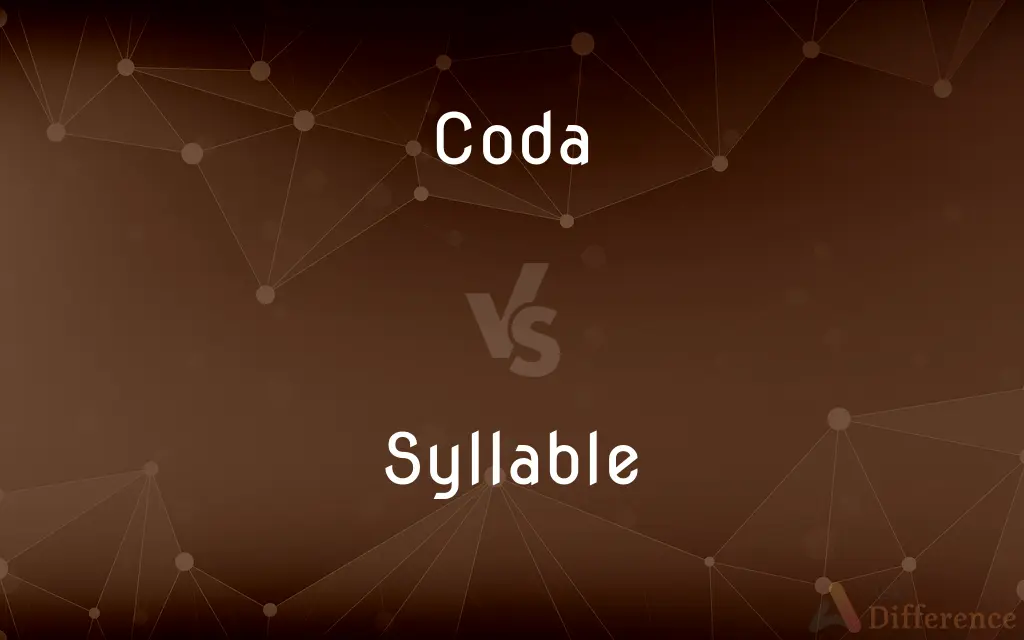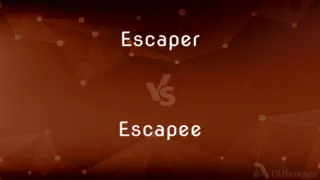Coda vs. Syllable — What's the Difference?

Difference Between Coda and Syllable
ADVERTISEMENT
Compare with Definitions
Coda
(Music) The concluding passage of a movement or composition.
Syllable
A syllable is a unit of organization for a sequence of speech sounds. It is typically made up of a syllable nucleus (most often a vowel) with optional initial and final margins (typically, consonants).
Coda
A conclusion or closing part of a statement.
Syllable
A unit of pronunciation having one vowel sound, with or without surrounding consonants, forming the whole or a part of a word; for example, there are two syllables in water and three in inferno.
Coda
(music) A passage that brings a movement or piece to a conclusion through prolongation.
ADVERTISEMENT
Syllable
Pronounce (a word or phrase) clearly, syllable by syllable.
Coda
(phonology) The optional final part of a syllable, placed after its nucleus, and usually composed of one or more consonants.
The word “salts” has three consonants — /l/, /t/, and /s/ — in its coda, whereas the word “glee” has no coda at all.
Syllable
A unit of spoken language consisting of a single uninterrupted sound formed by a vowel, diphthong, or syllabic consonant alone, or by any of these sounds preceded, followed, or surrounded by one or more consonants.
Coda
(geology) In seismograms, the gradual return to baseline after a seismic event. The length of the coda can be used to estimate event magnitude, and the shape sometimes reveals details of subsurface structures.
Syllable
One or more letters or phonetic symbols written or printed to approximate a spoken syllable.
Coda
(figuratively) A conclusion (of a statement or event, for example), final portion, tail end.
Syllable
The slightest bit of spoken or written expression
Do not alter a syllable of this message.
Coda
A few measures added beyond the natural termination of a composition.
Syllable
To pronounce in syllables.
Coda
The closing section of a musical composition
Syllable
(linguistics) A unit of human speech that is interpreted by the listener as a single sound, although syllables usually consist of one or more vowel sounds, either alone or combined with the sound of one or more consonants; a word consists of one or more syllables.
Syllable
The written representation of a given pronounced syllable.
Syllable
A small part of a sentence or discourse; anything concise or short; a particle.
Syllable
To utter in syllables.
Syllable
An elementary sound, or a combination of elementary sounds, uttered together, or with a single effort or impulse of the voice, and constituting a word or a part of a word. In other terms, it is a vowel or a diphtong, either by itself or flanked by one or more consonants, the whole produced by a single impulse or utterance. One of the liquids, l, m, n, may fill the place of a vowel in a syllable. Adjoining syllables in a word or phrase need not to be marked off by a pause, but only by such an abatement and renewal, or reënforcement, of the stress as to give the feeling of separate impulses. See Guide to Pronunciation, 275.
Syllable
In writing and printing, a part of a word, separated from the rest, and capable of being pronounced by a single impulse of the voice. It may or may not correspond to a syllable in the spoken language.
Withouten vice [i. e. mistake] of syllable or letter.
Syllable
A small part of a sentence or discourse; anything concise or short; a particle.
Before any syllable of the law of God was written.
Who dare speakOne syllable against him?
Syllable
To pronounce the syllables of; to utter; to articulate.
Syllable
A unit of spoken language larger than a phoneme;
The word `pocket' has two syllables
Share Your Discovery

Previous Comparison
Dogfish vs. Eelpout
Next Comparison
Escaper vs. Escapee













































